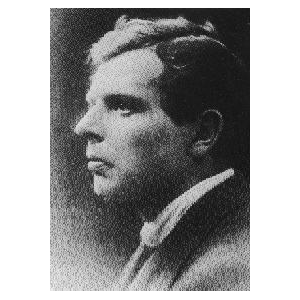
|
|||||

Cleeve Orchard Cider..
 Artisan maker of Little Owl cider from the last orchard in Ross on Wye Artisan maker of Little Owl cider from the last orchard in Ross on Wye
Gallery 54 - Ross on..
 Contemporary abstract art, ceramics and glassware Contemporary abstract art, ceramics and glassware
Life Changing Activi..
 Fun, adventure, and personal growth in the Great Outdoors Fun, adventure, and personal growth in the Great Outdoors
|
Ivor Gurney
 Ivor Gurney - 1890-1937, renowned poet of the first world war, lived in a house on what is now the A48 road near Minsterworth. Ivor Gurney - 1890-1937, renowned poet of the first world war, lived in a house on what is now the A48 road near Minsterworth.Along with Rupert Brooke, Wilfred Owen, Siegfried Sassoon and Isaac Rosenburg, he portrayed the horrors of the trenches in the war in poetry. A study of some of these most powerful poets provides a new way of approaching both the tragedy of the First World War itself and the characters of the men who witnessed and recorded it. The old ideals of warfare fought by aristocrats andgentlemen vanished beneath gas attacks, trench warfare, and heavy artillery bombardments. The war left behind broken bodies and cynicism in place of the optimistic views of the machine age. European and Authors and poets writing during and after the war had a great deal to say about horror and its attendant disillusionism. Writing changed from the high-flown, complicated prose of the late nineteenth century to a grittier, realistic style, exemplified by writers such as Ivor Gurney. Writers explained to themselves and to the world the effects of war on individuals and on society, partly helping to heal the wounds wrought in war. TOBACCO When tobacco came, when Raleigh did first bring in The unfabled herb, the plant of peace, the king Of comfort-bringers, then indeed new hope Came to the host of poets - with new scope, New range of power, since henceforth one might sit Midnight-on and still further, while the war of wit More kindly became and coloured till dawn came in Piercing shutter chinks with pale daylight thin. Raleigh he knew, but could not the impossible War of swift steel and hurtled bronze fortell, Nor the imaginary hurt on the body's vessel; Nor how tobacco then would steady disastered Nerves, courage by grey terror almost mastered. Gloucester men, half a day more, would hide Five cigarettes, and matches well inside Their breasts, the one thing unsodden, while despair Dripped incessantly without interest from the air; Or go supperless The better next day's tobacco taste to bless. Wonder at fogs, stars, posts till headaches came Those chief of trouble-comforts still the same. Watch Verey-lights, sandbags, grasses, rifle-sights, mud - Crampt in uncouth postures men crouched or stood - A Woodbine breakfast inspiring the blood. Or in those caves of dug-outs, men taking lazily Smoke in luxuriously, of Woodbines easily. For one stroke forgiving fate and its so mazily Self-entangled knots. Easing the strained back, Sonehow or other slipping unseen from the rack Into tobacco scent, or savour or look; The divine virtue of some contenting book Multiplying; or in the sunniest quiet resting Loll into restlessness or sleepy jesting. Tobacco truly taken, as a thing. Tobacco tasted exactly; in waves or ring Noted; tobacco blown to the wind, or watched Melt into ether's farthest smoother unmatched. Keen sentries whiffing surreptitously, Sly fatigue parties hidden from scrutiny, Last breath favours begged desparately. Over all the breath of the airy vapour is known, Life's curtain rises on it and Death's trembles down. Heroism has taken it for a sufficient crown. When I think of the Ark slapping hopeless waters - Of neas's sailors cursed with unclean hunger - Of Irus and his scorn, or the legions Germanicus Met, and was nearly scotted by whose anger, I know, I realize, and am driven to pity By unscorched eternal days of Babylon city And any unsoothed restless greedy clamour, As hunger for Empire, any use of war's hammer. Tea and tobacco after decent labour Would bring again England of pipe and tabor Merry England again after four centuries, Of dawn-rising and late-talking and go-as-you-please. 1919
More Local History
|
||||
|
|
|||||